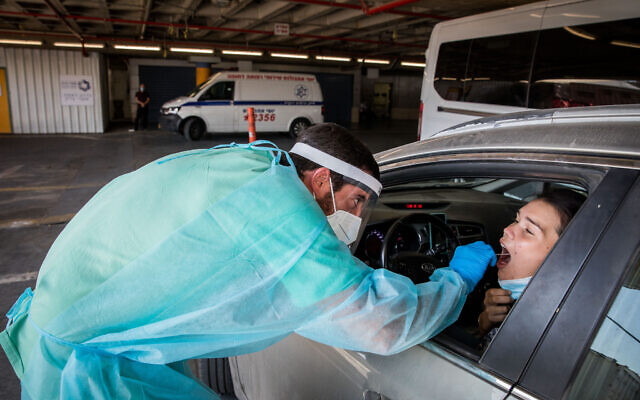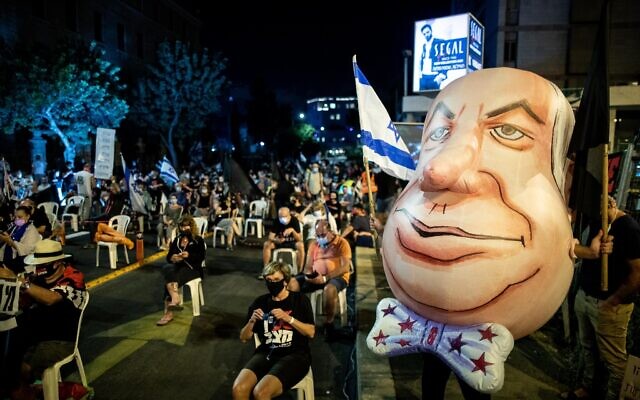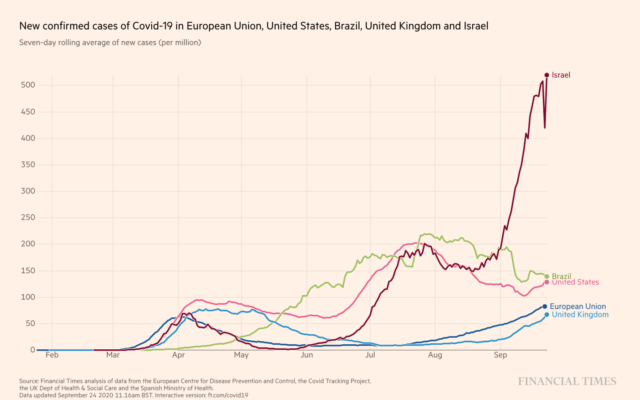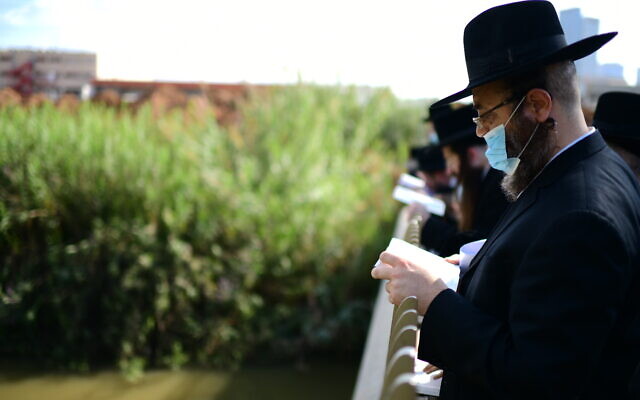Prime Minister Benjamin Netanyahu on Thursday defended the government’s decision to significantly tighten the national coronavirus lockdown starting Friday, as Israel continued to cope with one of the world’s highest daily coronavirus infection rates.
“The lockdown steps aren’t easy but saving life comes before everything,” he said during a press conference at the Prime Minister’s Office in Jerusalem. “We’re at the height of an ongoing war.”
As he spoke, an amendment to the coronavirus laws that will allow the government to enact new sweeping limitations cleared its first Knesset vote. The proposal moved to committee ahead of the second and third readings at the plenum.
Meanwhile, Netanyahu fought against reports that he had pushed for the tighter lockdown measures in order to stop ongoing protests against him by anti-corruption activists, calling such claims “absurd.”

Coronavirus czar Roni Gamzu during a meeting with Jerusalem Mayor Moshe Lion at the Jerusalem city hall on August 12, 2020. (Olivier Fitoussi/Flash90)
A report on Channel 13 news Wednesday said coronavirus czar Ronni Gamzu has privately said the lockdown decision was all about stopping the protests, calling the move “terrible” and its motives “disgusting.”
The prime minister said many other countries besides Israel were dealing with resurgent outbreaks of the virus, some of whom have also tightened restrictions on gatherings and businesses. Israel last week became the first developed country to impose a second nationwide lockdown, which will now harden considerably.
Netanyahu blamed “populist politicians” for rising infections, accusing them of encouraging the public not to adhere to Health Ministry guidelines, and saying the easing of restrictions after the first lockdown caused Israelis to flout the rules.
He singled out opposition leader Yair Lapid, accusing him of “endangering the lives of Israeli citizens,” as well as Likud MK Yifat Shasha-Biton, who as head of the Knesset coronavirus committee overruled a limited number of government restrictions in parliament several months ago.
Lapid on Thursday said Netanyahu’s “failure” was responsible for Israel entering an avoidable new restrictive closure. “It could have been managed differently, it should have been managed differently,” he said.
Speaking before Netanyahu, Defense Minister Benny Gantz acknowledged the government’s failures in containing the pandemic.
“The decision on reopening the economy [after the first lockdown] came too quickly. The decision to move the contact tracing system to the military came too late,” he said in a televised statement from his home in Rosh Haayin.
“But all of this is less important right now. And what we must do now is take action,” added Gantz, who heads Blue and White.

Defense Minister Benny Gantz gives a televised statement at his home in Rosh Haayin on September 24, 2020. (Screen capture: Facebook)
Gantz said Israel was in the midst of “one of the toughest crises we’ve known,” noting the country has one of the highest infection rates in the world per capita, and growing unemployment.
“We’re in a national emergency,” he said, likening the fight against the pandemic to a war.
Netanyahu said the rising virus deaths were a “terrible price.” He also warned that a growing body of research shows that up to 20 percent of those who recover from the virus, including the young, will suffer chronic complications.
“Wake up. Enough is enough. We’re in a new reality. We must take action. And we must do it now,” he said.

Police fine a man for violating the national lockdown rules at the Jaffa Gate in the Old City of Jerusalem on September 24, 2020. (Olivier Fitoussi/Flash90)
Netaynahu argued it was preferable to impose a lockdown over the current holiday period, saying there was less economic activity during this time.
He said there were reasons for optimism and that he was working on securing fast coronavirus testing for Israel, which will produce results in minutes rather than hours.
“There’s a light at the end of the tunnel, because it’s clear to me there will be a vaccine,” the premier said.

A Shaare Zedek staffer wears protective gear as he takes a swab from a woman to test for the coronavirus, outside the coronavirus unit at the hospital in Jerusalem on September 14, 2020. (Nati Shohat/Flash90)
He also said it was “absurd” to say that he was pushing for a nationwide lockdown to stop ongoing protests him over his indictment on graft charges and handling of the pandemic, before railing at length against the demonstrations.
Netanyahu spoke against those who have demonstrated against him in recent months, gathering in the thousands in weekly demonstrations outside his Jerusalem residence.
He rejected the notion that he had sought the full lockdown to halt politically damaging protests, arguing that “these anarchist and ludicrous protests” actually help him politically, but “the public is sick of them.”
“It hurts public trust” in the regulations, he said. “The demonstrations… show contempt for the rest of Israelis” who must follow social distancing rules, Netanyahu said.
He said the demonstrations were “incubators” for both the virus and for anarchy, and said they’d been held in Israel on “a scale seen nowhere else in the world.”
There has been no data to show protests have been the cause of infection spread. The virus is thought to mostly spread in indoor spaces rather than in the open air, and most protesters wear masks.
Netanyahu added: “The right to demonstrate, like the right to pray, the right to earn a living, the right to transportation, are very important rights, sacred rights in a democracy. But they are not unlimited rights. The right to life is also a right.”
Shortly after the press conference, Justice Minister Avi Nissenkorn of the coalition’s Blue and White party lashed out at Netanyahu for his comments on the protests. “It’s embarrassing to see that Netanyahu has chosen to continue to incite against the protesters tonight,” Nissenkorn tweeted.
“Everyone is to blame but the prime minister. The protesters at Balfour [Netanyahu’s residence] are not responsible for the crisis, and they will be [able] to exercise their democratic right without restrictions after the lockdown is lifted,” added Nissenkorn.

Protestors against Prime Minister Benjamin Netanyahu, outside his official residence in Jerusalem on September 24, 2020. (Yonatan Sindel/Flash90)
Gantz also addressed the cabinet’s decision to limit protests and prayers, after extensive squabbling between ministers. “This is not a fight between prayer and protest” but is rather an effort to save lives, said Gantz. Those who seek to pray “and endanger people’s lives” can do so outside their homes, he added, while those who seek to protest “and endanger people’s lives” can do so outside their homes.
During the press conference, Netanyahu also dismissed the Finance Ministry’s prediction that the lockdown will cost the economy NIS 30 billion and defended his decisions not to heed Gamzu’s recommendation for a softer lockdown.
“I respect the experts but the citizens of Israel didn’t elect bureaucrats,” he said.
Lapid gave his own televised statement, ripping into the lockdown rules but urging Israelis to follow the regulations.
“The State of Israel is entering a lockdown it didn’t need to enter,” he said. “It’s Netanyahu’s failure. It could have been managed differently, it should have been managed differently.”
Lapid, who heads the Yesh Atid party, said it was not true that the world was helpless in the face of the second wave of the virus, as Netanyahu has suggested. He displayed a graph from the Financial Times showing the infection rate in Israel was far higher than in places such as the United States and Brazil, two of the countries hardest hit by the pandemic.
“It’s another lie over which the government has lost public trust,” he said, arguing governments around the world that had prepared properly were able to keep numbers down.

New confirmed cases of the coronavirus in the European Union, United States, Brazil, United Kingdom and Israel: Seven-day rolling average of new cases, per million, September 24, 2020 (Financial Times screenshot)
Lapid accused the government of not having a plan to bring the outbreak under control, while still agreeing that lockdown rules must be observed.
“We will pray responsibly, we will protest responsibly… We won’t let Netanyahu turn this into a war between the secular and religious,” he said. “The government isn’t protecting us; let us protect ourselves.”
Laying out his own plan, Lapid said the government needs a strategy for easing the lockdown; a financial plan for the self-employed; an improved contact tracing system; a spokesperson for the virus response; and to transfer much of the authority to handle the virus to local councils.
He said ministers who violate the rules should resign, including the prime minister. Several ministers in the current government, and Netanyahu himself, have been caught violating regulations over the past months.
“We must rebuild public trust,” Lapid declared.
The government’s approval of the new restrictions early Thursday came a week after the current lockdown began, and as new daily confirmed infections neared 7,000 on Wednesday for the second straight day.
Beginning Friday at 2 p.m., nearly all businesses will be closed, with the exception of specific companies and factories designated as “essential” by the Defense Ministry’s National Emergency Authority. The decision, drafted Wednesday by the coronavirus cabinet and approved by the full cabinet on Thursday morning, exempted supermarkets and pharmacies from the closure, and allowed restaurants to work on a home-delivery basis only.
Yom Kippur prayers that begin Sunday evening will take place almost entirely outdoors, with groups of up to 10 worshipers permitted to pray inside synagogues, the decision said. The shutdown will also cover the entirety of the Sukkot holiday.

Ultra-Orthodox Jews perform a tashlich religious ceremony ahead of Yom Kippur, at the Yarkon River in Tel Aviv on September 24, 2020. (Tomer Neuberg/Flash90)
According to the Health Ministry’s latest figures Thursday evening, the number of infections since the pandemic began stood at 212,115.
The national death toll rose to 1,378 — 43 more fatalities since the morning update, though the ministry issued conflicting messages on whether all had died over the past day or were prior deaths added to the tally retroactively.
Of the 61,924 active cases, there were 685 people in serious condition, 172 of them on ventilators. Another 258 were in moderate condition, with the rest displaying mild or no symptoms. Overall, 1,356 people were hospitalized with COVID-19.
The ministry also said that of the 44,156 coronavirus tests analyzed so far on Thursday, 13.7 percent were positive.
Related posts:
Views: 0
 RSS Feed
RSS Feed

















 September 25th, 2020
September 25th, 2020  Awake Goy
Awake Goy 
 Posted in
Posted in  Tags:
Tags: 
















